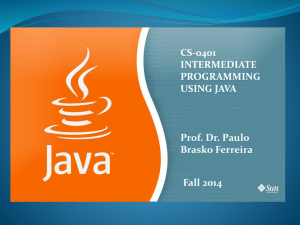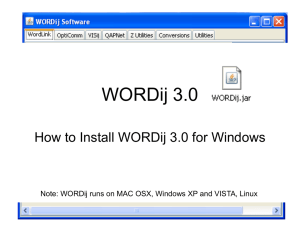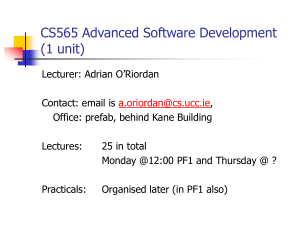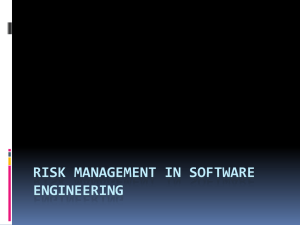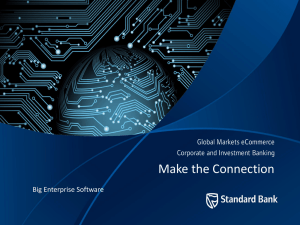Syllabus - Florida Atlantic University
advertisement
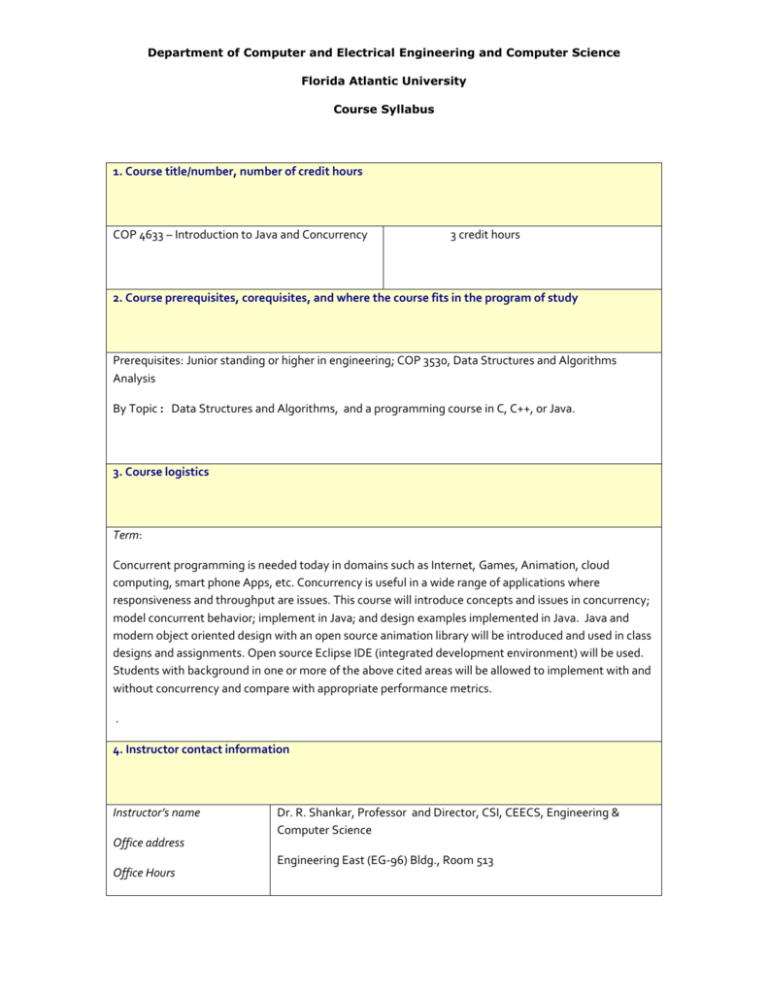
Department of Computer and Electrical Engineering and Computer Science Florida Atlantic University Course Syllabus 1. Course title/number, number of credit hours COP 4633 – Introduction to Java and Concurrency 3 credit hours 2. Course prerequisites, corequisites, and where the course fits in the program of study Prerequisites: Junior standing or higher in engineering; COP 3530, Data Structures and Algorithms Analysis By Topic : Data Structures and Algorithms, and a programming course in C, C++, or Java. 3. Course logistics Term: Concurrent programming is needed today in domains such as Internet, Games, Animation, cloud computing, smart phone Apps, etc. Concurrency is useful in a wide range of applications where responsiveness and throughput are issues. This course will introduce concepts and issues in concurrency; model concurrent behavior; implement in Java; and design examples implemented in Java. Java and modern object oriented design with an open source animation library will be introduced and used in class designs and assignments. Open source Eclipse IDE (integrated development environment) will be used. Students with background in one or more of the above cited areas will be allowed to implement with and without concurrency and compare with appropriate performance metrics. . 4. Instructor contact information Instructor’s name Office address Office Hours Dr. R. Shankar, Professor and Director, CSI, CEECS, Engineering & Computer Science Engineering East (EG-96) Bldg., Room 513 Department of Computer and Electrical Engineering and Computer Science Florida Atlantic University Course Syllabus Contact telephone number 561-297-3470/ (561) 306-5625 Email address shankar@fau.edu 5. TA contact information TA None 6. Course description This course makes it practical and accessible to learn about concurrency and concurrent programming and to combine theory and practice in one common environment. The course allows students to verify and resolve concurrency issues at a high level of abstraction and implement the same in Java. The first one-third of the semester will focus on Java, object oriented design, and library-based design. The remainder of the course focuses on concurrency issues. 7. Course objectives/student learning outcomes/program outcomes Course objectives This course is designed to help students understand concurrency concepts and develop software that can avoid concurrency pertinent failures. The tools will demonstrate good and bad practices in designing concurrent systems, by implementing certain modern applications with animation, gaming, Bluetooth, smart phone Apps, and client-server applications. 8. Course evaluation method Four concurrency programming assignments, 15% each. A mid-term and final exam worth 20% each. 9. Course grading scale Grading Scale: It will be based on a curve. Expected distribution is given below: Department of Computer and Electrical Engineering and Computer Science Florida Atlantic University Course Syllabus 90 and above: “A”, 85-89 “A-“, 80-84: “B+”, 75-79: “B”, 70-74 : “B-“, 65-69: “C+”, 60-64: “C”, 55-59: “C-“, 50-54: “D+”, 45-49: “D”, 40-44: “D-“, 39 and below: “F.” 10. Policy on makeup tests, late work, and incompletes There will be a midterm and a final exam in this course. A grace period of 1 week is allowed for submission of assignments. One makeup take=-home may be attempted if the other assignment scores are not satisfactory. However, expect this assignment to be challenging and open-ended. Incomplete grades are against the policy of the department. Unless there is solid evidence of medical or otherwise serious emergency situation incomplete grades will not be given. 11. Special course requirements Students will program in Java using Eclipse IDE. 12. Classroom etiquette policy Students have to use laptops in the class to conduct Eclipse and Java library tool installation, training, programming, etc . Also, classes will be more problem solving oriented. There will be significant interaction among the students and the professor during the class room, on a basis to solve problems and gain deeper insight. So, have your laptop ready and be prepared to use it during the lectures. 13. Disability policy statement In compliance with the Americans with Disabilities Act (ADA), students who require special accommodations due to a disability to properly execute coursework must register with the Office for Department of Computer and Electrical Engineering and Computer Science Florida Atlantic University Course Syllabus Students with Disabilities (OSD) located in Boca Raton campus, SU 133 (561) 297-3880 and follow all OSD procedures. 14. Code of Academic Integrity Policy Students at Florida Atlantic University are expected to maintain the highest ethical standards. Academic dishonesty is considered a serious breach of these ethical standards, because it interferes with the university mission to provide a high quality education in which no student enjoys unfair advantage over any other. Academic dishonesty is also destructive of the university community, which is grounded in a system of mutual trust and place high value on personal integrity and individual responsibility. Harsh penalties are associated with academic dishonesty. See University Regulation 4.001 at www.fau.edu/regulations/chapter4/4.001_Code_of_Academic_Integrity.pdf We will use mostly open source tools. Much code, reference designs, etc., are freely available at many sites on line, including our own. 15. Required texts/reading Concurrency, State Models and Java Programs, by Jeff Magee and Jeff Kramer, 2 nd Edition, Wiley, 2006. ISBN: 0-470-09356-0; Also download the LTSA software and run the Applets of several book examples at: http://www.doc.ic.ac.uk/~jnm/book/ Programming in Java will use this book: Java – Learning to Program with Robots, by B. W. Becker, U of Waterloo, Canada, Thomson Course Technology, 2007. The book is available in PDF format, along with the robotics library (as a .jar file) at: http://www.learningwithrobots.com/ . The author has made all of it available free. You will be developing parallel and concurrent programs as 16. Supplementary/recommended readings None 17. Course topical outline, including dates for exams/quizzes, papers, completion of reading Department of Computer and Electrical Engineering and Computer Science Florida Atlantic University Course Syllabus Lectures, Labs, and Hands-On Java Demos (in parentheses, number of 80 minute lectures) 1. Eclipse and Java library installation: Tutorial (1 lecture) 2. Object Oriented Design- (4 lectures) – Chapters 1-4 / Becker 3. Programming with Java (4 lectures) - Chapters 1-4/ Becker 4. Concurrency programming with Java (introduction)- (4 lectures) – Chapters 1-2/Magee 5. Concurrency Modeling– (5 lectures) – Chapter 3/Magee 6. Mutual Exclusion ,Synchronization and Deadlock (4 lectures) – Chapters 4-5/Magee 7. Graphical User Interface with Spring (3 lectures) - Chapter 13/ Becker 8. Support tools for App development in gaming, smart phone apps, Bluetooth, animation, and Internet computing (5 lectures) – handouts. Dates: (1) Four individual programming assignments at 15% each, 2 during the first 9 lectures, and 2 during the last 9 lectures; (2) A midterm exam worth 20% in the 7 th week; (3) a final exam at semester end. All the assignments and exams will be administered via Blackboard. 18. Technical Resolution Policy - You will be using Blackboard tools for communication. On the Welcome page, once you log in, you have the option to ‘Submit a Ticket’ (see on the left hand side) to the Online Support Center. They may also be reached at 561-297-3999. However, they will not be able to help you with the installation and use of the tool suite used in the class. We have excellent tutorials/demos at the authors’ sites, android.fau.edu and many other on-line sites. First try these things and if you still have difficulties, feel free to contact Dr. Shankar.

